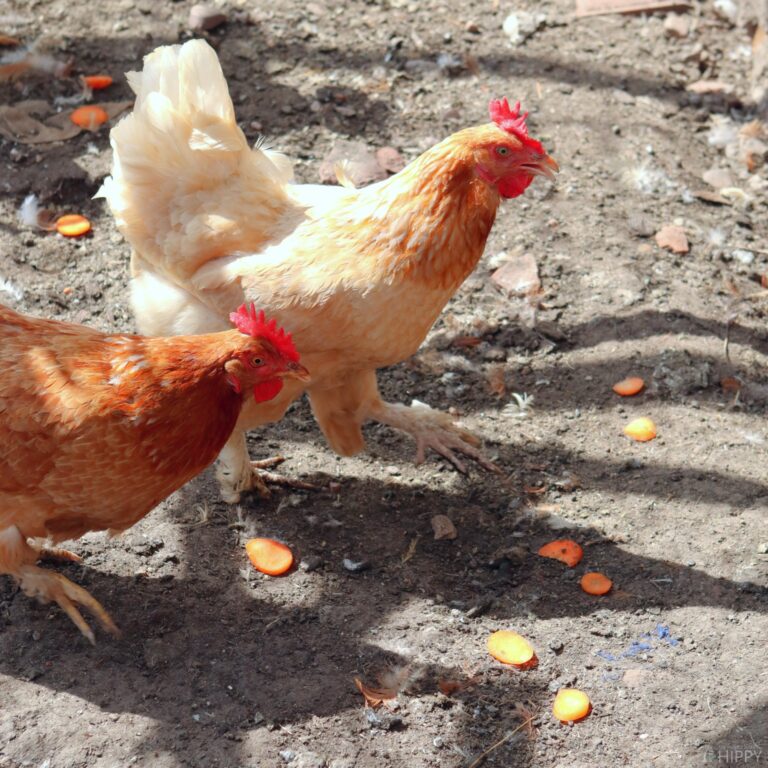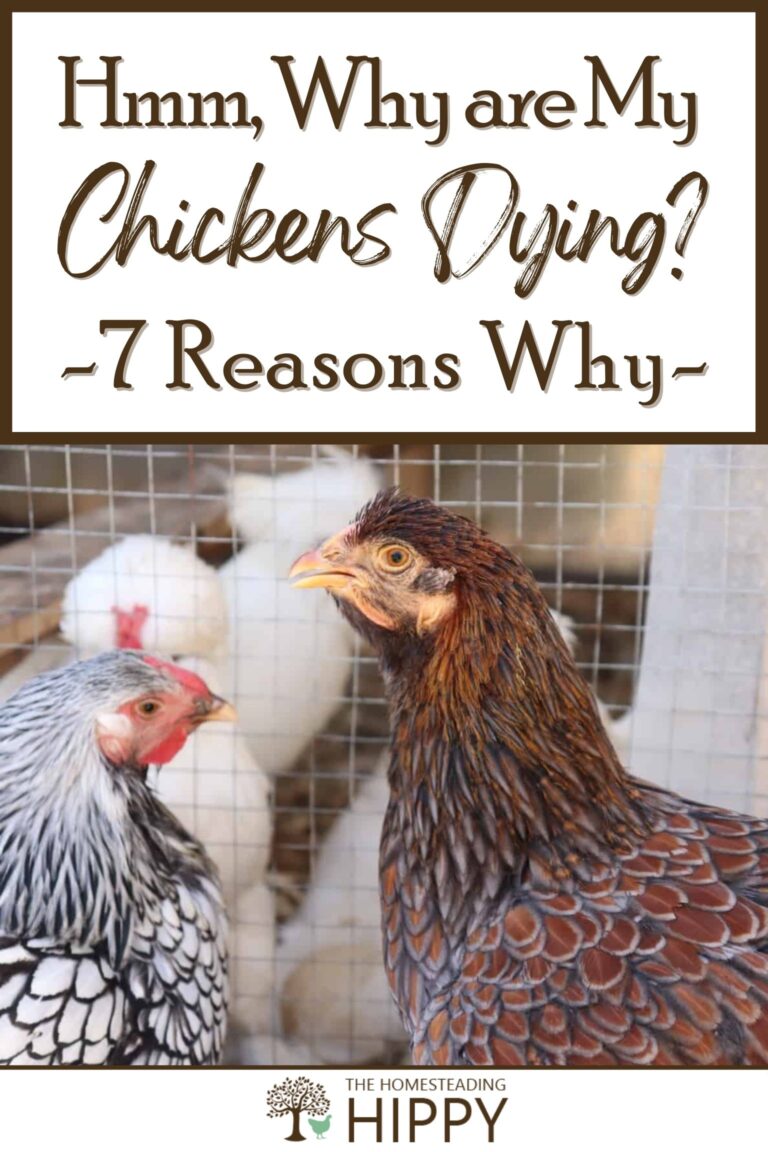Most chicken owners have been through it, and if they haven’t they probably will: you come out to check on your flock in the run or in their coop, and you find one or more of your birds lying there stone dead, not a mark on them.

It is unexpected and seemingly unexplainable, and it is always terrible to experience.
Most of us know by now that you can expect to lose a bird to a predator every so often, missing or torn up, but a sudden and inexplicable death hits harder. Did you miss something? Is it something you did or did not do? Why are your chickens dying?
Chickens may die suddenly from a variety of factors, including accidental poisoning, disease, parasitic infestation, heart attack, internal injuries, crop impaction, or a stuck egg in the case of hens.
It is a bummer, but it is something all owners need to be prepared to deal with. And if you are lucky and diligent, you might even spot the subtle signs that something is indeed wrong, and take action before one of your beloved birds suffers fatal consequences.
Keep reading to learn more about the most common causes of sudden or symptomless death in chickens.
1. Poison
Far and away, one of the most common and also, sadly, quickest acting killers of chickens is poisoning.
Chickens are curious eaters but generally pretty good about avoiding most natural items that could harm them. Unfortunately, they aren’t always successful, and there are plenty of man-made or novel toxins that they will eat.
If there is something poisonous in their environment, there is always a chance they might find it and eat it.
Poisons for chickens run the gamut from terribly toxic plants and mushrooms to chemicals present around the home and property used for pest control or fertilization.
Many common household products and even some common veggies or fruits can be toxic to chickens. Some of the most commonly reported poisons for chickens include:
- Chickens eating rat poison or other rodenticides, either on their own or after eating a poisoned rodent
- Eating moldy food or feed, some molds can release deadly toxins after being consumed
- Drinking water contaminated with harmful runoff or treatment chemicals
- Eating food or yard waste contaminated with herbicides or pesticides
- Yew, oleander, azalea, rhododendron, and various other plants can be poisonous to chickens if eaten
- Avocado skin and pits, tomato leaves and vines, rhubarb leaves, raw beans or bean pods, and uncooked potatoes or potato eyes can cause digestive upset and even death
- Chocolate, coffee grounds, caffeine, alcohol, onions, garlic, and avocado are all poisonous to chickens
There is much you can do to reduce the chances that your flock might fall victim to poisoning, but you cannot control every single variable.
Any number of their products or food might be accidentally contaminated, a poisoned mouse could be dropped by a passing bird of prey, and so on.
Your best bet is to familiarize yourself with the most common sources of avian poisoning, and then learn what those symptoms look like.
Most express themselves sharply and suddenly, but you have only a little bit of time to intervene before death is certain in the case of serious poisonings.
As always, if you have any doubts about a bird that seems suddenly ill or off, call your vet!
2. Disease
There are many diseases that affect chickens and might result in what appears to be sudden death.
Most, though, will present various symptoms that an alert owner can spot. This gets harder and harder to do the larger your flock grows. As with most illnesses, early treatment tends to improve the chances of recovery.
Failure to spot symptoms in time might lead to a bird dropping dead in the future. Some of the more common diseases that can cause sudden death include:
Coccidiosis is a parasitic infection of the gut that is incredibly common in young chicks. It will result in weight loss, lethargy, bloody diarrhea, and possibly sudden death if left untreated
Infectious Bronchitis is a viral respiratory disease that presents with coughing, wheezing, and eventually severe respiratory distress. Birds might stop eating and become very lethargic.
Newcastle Disease is another viral respiratory illness that initially presents with milder symptoms and soft stools. It then progresses to neurological symptoms like tremors, paralysis, and seizures before leading to death.
Fowl Pox, is a virus spread by mosquitoes and other insects that causes lesions on the skin and inside the mouth. It can lead to respiratory problems and eventually death by asphyxiation as the airway becomes blocked.
Infectious Bursal Disease, a virus that attacks the lymphoid system and causes severe weight loss, foamy diarrhea, trembling and weakness before affected birds collapse with their heads low. Highly lethal, and usually shows symptoms and kills quickly.
Marek’s Disease is a virus that attacks the nervous system and can cause paralysis, blindness, and eventually death. Look for gray or pale blue pupils.
As you can see, there are many potential illnesses that can cause sudden death in chickens if untreated. Some are more common than others but all have the potential to kill if not treated quickly.
The best thing you can do is to be vigilant about watching for signs of illness in your flock and contacting your vet at the first sign of anything wrong.
3. Parasite Infestation
Parasites are another sometimes subtle killer of chickens and, contrary to popular belief, it isn’t just the really nasty internal ones that can reliably kill.
External parasites like lice, mites, and ticks can also cause problems if they are left unchecked. These creatures will bite and feed on your chickens, causing irritation, restlessness, and eventually anemia.
This will lead to listlessness, lethargy, and even death in severe cases as the chicken succumbs to stress and increasing vulnerability to other ailments. Luckily, most external parasites start to leave telltale indications of their presence.
But, of course, some of the internal parasites are the very worst, and can cause many of the same problems as the external bloodsuckers while also causing severe organ damage and nutritional deficiencies.
If you have a stoic bird or just aren’t paying close attention in might seem like a chicken dies suddenly from one of these internal parasite infestations.
These include worms of which lungworms, which eat up lung tissue, and gapeworms, which block the airway, are the most deadly. You also have flukes which are flatworms that parasitize the liver.
Again, the best way to combat these problems is through prevention. This means regularly checking your birds for parasites, using treatments as needed, and taking pains to keep their environment as clean as possible.
4. Heart Attack
Chickens can suffer from heart attacks just like people can, and often for the same reasons. A heart attack occurs when the supply of blood to the heart is suddenly cut off, usually by a blockage in one of the arteries.
This can be caused by a buildup of plaque, just like in human hearts, but it can also be caused by parasites or other foreign bodies. Whatever the cause, the result is the same: the bird drops followed by sudden death.
Heart attack risk factors include age, excess weight, and even genetic factors- again, just like people.
So, if you have an aging flock or a lot of overweight birds, pay close attention to signs of heart problems.
High-stress levels also contribute to heart attacks, meaning that birds living in terrible conditions that are overcrowded or constantly in peril are at much higher risk.
Unfortunately, aside from managing what risk factors you can, there is no real way to prevent heart attacks in chickens.
5. Internal Injuries
This is another sneaky cause of sudden death in yard birds. Your chickens might seem to lead an unadventurous life but that does not mean they cannot be injured.
A fight, fall or other mishap might lead to anything from a broken bone or head injury to internal bleeding, and any of them have the potential to kill if not treated quickly.
In some cases, the injury will be immediately obvious thanks to external indicators, e.g. blood, suddenly limping, holding one wing out, etc.
But, sometimes the signs are much more subtle, and it can be impossible to spot them until it’s too late. If you find a dead bird with no obvious injuries, it’s worth checking for things like bruising or internal bleeding.
Again, assuming you are taking even a little bit of care in keeping your birds there is probably not much you can do to prevent all outcomes. Stopping serious fights removing anything in their environment that contributes to misadventure is a good idea.
6. Crop Impaction
This one is particularly nasty, and can cause a very sudden death, especially in young birds.
The crop is the part of a chicken’s anatomy where food is held to be softened by digestive juices before passing into the gizzard.
If something goes wrong and the crop becomes impacted, then the bird will slowly starve as it cannot eat anything.
Crop impaction can be caused by eating too much of certain foods like grasses and leaves, or the wrong things like garbage, plastic or strings, etc.
Sometimes, chickens swallow too-large stones when eating grit, and they can get caught in the crop and block everything else from getting through.
The good news is that crop impaction is relatively easy to spot and treat if you catch the symptoms which include a distended, hard crop that feels full even when the bird has not eaten for a while.
If you notice a bird not eating and generally acting like it is in distress, look closer.
7. Stuck Egg
This is a cause of death that will only affect laying hens, for obvious reasons. It occurs when an egg becomes stuck in the oviduct, usually because the hen is not getting enough calcium which makes her eggs too soft.
The hard shell of the egg then presses on the lining of the oviduct, cutting off blood flow and causing tissue death.
In some cases a larger and more developed egg will physically block the hen’s vent, preventing the elimination of waste. If either case, the hen will likely die within 12 hours unless she receives emergency treatment.
You can help prevent this by feeding your hens a diet that is high in calcium, providing them with plenty of fresh water, and making sure they have a clean and comfortable place to lay their eggs.
Also, keep a close watch on any hens that seem to lay very large eggs; these monster layers will struggle to pass the eggs, especially if they are not in their prime.

Tom has built and remodeled homes, generated his own electricity, grown his own food and more, all in quest of remaining as independent of society as possible. Now he shares his experiences and hard-earned lessons with readers around the country.
Find out more about the team here.
